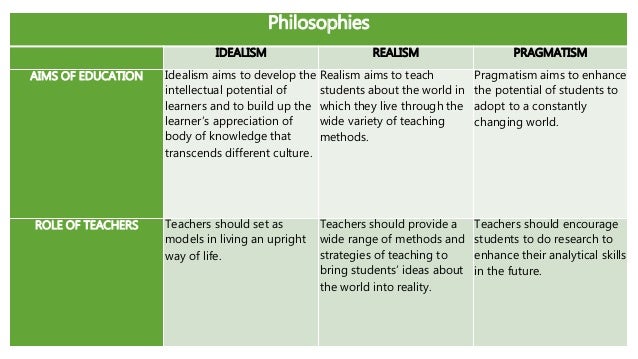4 Educational Philosophies

- Length: 4 pages
- Sources: 3
- Subject: Black Studies - Philosophy
- Type: White Paper
- Paper: #77827298
- Related Topics: Common Core Standard, Philosophy Of Education, Philosophy, Meaning Of Life

Excerpt from White Paper :
Educational PhilosophyThe four Educational Philosophies
Essentialism
Essentialism argues that a common core of knowledge needs to be passed to learners in a disciplined and systematic manner. The concentration in this traditional viewpoint is on moral and intellectual standards that academic institutions should educate. The curriculum focuses on knowledge, skills, and academic rigor. Although this academic viewpoint is similar in some ways to Perennialism, Essentialism accepts the idea that this core curriculum may change. Education should be realistic, preparing learners to become useful people in the society. It should concentrate on facts and 'the fundamentals,' training learners to speak, write, read and think clearly and rationally. Schools must not try to set or influence guidelines. Students should be trained self-discipline, respect for authority, and hard work. Instructors are to help learners keep their non-productive intuition in checks, such as mindlessness or aggression. This strategy was in response to progressivism techniques frequent in the Twenties and 30s (Barnes, 2008). William Bagley introduced the concept of essentialism in 1934. Other supporters of Essentialism are James Koerner, H.G. Rickover, Theodore Sizer and Paul Copperman.
Perennialism
Perennialism claims that the aim of education is to ensure that learners acquire understanding about the excellent concepts of civilization. These concepts have the potential for fixing problems in any era. The focus is to educate concepts that are long-term, to seek sustained facts, which are constant, as the natural and human planets at their most essential level, do not change. Educating these constant concepts is critical. Humans are logical people, and their minds need to be expanded. Thus, cultivation of the intelligence is the most important in a beneficial education. The challenging curriculum concentrates on acquiring cultural knowledge, pushing kids' growth in enduring professions. The loftiest achievements of humankind are emphasized -- the excellent works of art and ...Supporters of this educational viewpoint are Maynard Hutchins and Mortimer Adler.
Experimentalism
Experimentalism appeared from the concepts of progressivism, pragmatism, and Reconstructionism. They have a common historical break from the most conventional concepts of idealism and realism. The essentialist concept that truth, knowledge, and morality exist as absolute and outside people is disputable (Segall & Wilson, 2004). The growing trust in the scientific technique, the capability of people to make their machines, principles and law and the point that such man-made technology would work for them required an accompanying philosophy. Experimentalism served that philosophy. Managers are not exclusively conveyors of age-old wisdom; they are both the conveyers of the standard literacy of the time and the guiders of trial-and-error, exploratory learning.
Existentialism
Existentialism is the cultural and philosophical concept, which claims that the starting point of philosophical reasoning must be the encounters of the person. Ethical and scientific reasoning together cannot be sufficient to comprehend human existence, so a further set of groups, controlled by' authenticity,' is necessary to comprehend human existence. Existentialism started in the mid-19th century as a response to the then-dominant methodical philosophies, such as those designed by Kant and Hegel. Kierkegaard S, usually regarded to be the first existentialist thinker, posited that a person is completely accountable for providing meaning to life and for leading a passionate and sincere life. Other well-known supporters associated with the philosophy were Friedrich Nietzsche, Martin Heidegger, Albert Camus, Gabriel Marcel, Simone de Beauvoir, Karl Jaspers and Fjodor Dostoyevsky.
Differences between the four Educational Philosophies
Although the notions of existentialism and essentialism seem to be similar often, there are still serious variations regarding primary ideologies. First, essentialism states that all things are created with a set, essence that describes them. Existentialists, notably Jean-Paul Sartre, go against this idea as they declare that people are born with no definition or purpose. As such, they must act through free…
Six Philosophies Of Education
The Philosophy of Education Statement is an important piece in your educator portfolio. It may be requested by hiring personnel at schools to be included with a cover letter and resume. Your teaching philosophy should be thoughtful, organized and well written. These educational philosophical approaches are currently used in classrooms the world over. They are Perennialism, Essentialism, Progressivism, and Reconstructionism. These educational philosophies focus heavily on WHAT we should teach, the curriculum aspect. Module 4: Educational Philosophies: Essentialism, Perennialism, Progressivism, Reconstructionism. After submitting my answers to Group Discussion 2, I started reading the educational philosophies. I tried to follow how I was supposed to do the learning activities by answering all the study questions for each philosophy one by one. There are many different types of philosophies in education. Here we will focus only on the four main types of philosophies that may help you to form your teaching philosophy and write your teaching statement - Perennialism, Essentialism, Romanticism and Progressivism. A mix of more than two philosophies is called Eclecticism.
4 Types Of Educational Philosophies
